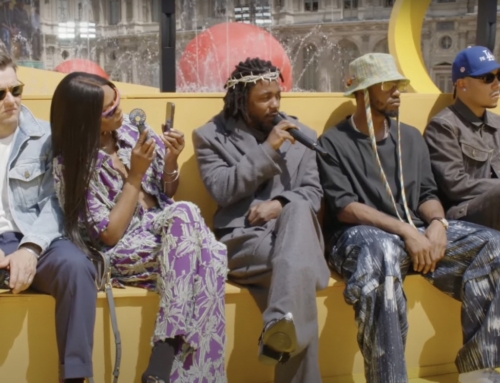 Collaboration is a trend seemingly inherent in EDM. That is, through it’s wide use of technologies, electronic music allows for musicians of vastly different influences and backgrounds to fuse their styles and sounds in order to create something new. This is a great idea in theory, but in the case of “People of the Night,” the newest release from long-time collaborators AN21 and Max Vangeli, the word “new” is hardly the word to describe what I found operating throughout the album’s fifteen tracks. Rather, the resulting music is as cliché and redundant as the mainstream pop music on the radio. Which is something of a surprise considering the previous successes of the two artists. They’ve produced music both as a duo and as solo acts, releasing music on both Size and Refune. They’ve remixed artists such as Ellie Goulding, Pendulum, and Gorillaz. And they’ve performed all over the world, at festivals and in dance clubs, forcing me to question: what went wrong?
Collaboration is a trend seemingly inherent in EDM. That is, through it’s wide use of technologies, electronic music allows for musicians of vastly different influences and backgrounds to fuse their styles and sounds in order to create something new. This is a great idea in theory, but in the case of “People of the Night,” the newest release from long-time collaborators AN21 and Max Vangeli, the word “new” is hardly the word to describe what I found operating throughout the album’s fifteen tracks. Rather, the resulting music is as cliché and redundant as the mainstream pop music on the radio. Which is something of a surprise considering the previous successes of the two artists. They’ve produced music both as a duo and as solo acts, releasing music on both Size and Refune. They’ve remixed artists such as Ellie Goulding, Pendulum, and Gorillaz. And they’ve performed all over the world, at festivals and in dance clubs, forcing me to question: what went wrong?
The opening track, “People Of The Night,” starts out with a looped voice clip acting as a metronome, sounding a bit like someone choking and distracting from the ambient synth sounds floating in the back. The beat drops around one minute, and it’s the to-be-expected quarter note bass drum thuds. The use of tambourine is a nice touch, but this textural element is drowned out by the cringe-worthy, in-your-face melody. Then enter acoustic guitar and the female vocalist from Lover Lover sing a pseudo-folk ballad right in the middle of the track, which felt forced and out of place, in my opinion. Then the music rebuilds to its former intensity, with even more superficial thrills than ever, but at this point, I felt there was nothing present in the music I hadn’t heard elsewhere on the track.
Although the first track was…underwhelming, I wasn’t prepared to give up on the album just yet, and was hoping that track two, “Glow,” would redeem the duo’s efforts. The track starts out with simple beat headed by a clap track and is soon pulsing beneath a whiny pop synth melody. The guest vocalist, Bnann, can be heard belting some pretty shotty lyrics, something about “going the distance.” I’m not sure. The bridge between the verses isn’t so bad, the buzzing synths vibrating above the beat sounds pretty cool, but overall, the music feels overly-dramatic and predicable. When the track arrives at the descending triplets, and Bnann is going on and on about “Going!” I found myself begging for the song to be over, but there were a full three minutes left to this heaping pile of mediocrity.
Track three, “Lost,” has a decent energy build at the beginning. Discordant and suspenseful, seemingly building up to something large and magnificent, and then, as a huge disappointment, falls into this hokey, uninspired piano line punctuated by a bubble-gum synth melody. This somehow leads into a dubstep bass drop, which is half decent, but when placed within the context of the rest of the song, it doesn’t really make much sense. This track is the best so far, but it’s only minimally keeping my interest. Again, this is the best track, and it’s accomplishing the bare minimum amount of creativity and ingenuity required to produce enjoyable music!
I have to be honest, it’s killing me to write this review, as this music, in my opinion, does not deserve to be written about. It deserves to be danced to drunkenly and then immediately forgotten. AN21 and Max Vangeli should remove their names from this bland, uninteresting wasteland of sounds labeled EDM. There are twelve tracks left.
I would be lying, however, to state that there weren’t any decent tracks on the album. Track five, “H8R5,” is not half-bad. This music starts out with a synth glissando over a steady clap track, building to a well-placed bass drop. The music then reconstructs its former driving energy with the introduction of a searing synth melody along with samples of screaming and yelling. A rare gem on an otherwise painful album.
Track eight, “Vafan,” finally allows me some material I can critique rather than slander endlessly. This track focuses heavily on expansive atmospheres, filling the stereo field with everything from smooth drawn out synth tones to odd, discordant beeps and blats. I’ll admit, this track has a lot of tension behind it, and it’s is explored pretty thoroughly. The middle of the song is worth mentioning as well, with the slowing down of the beat to a near standstill, then speeding it up again and combining its renewed energy with a wall of synth noise. Pretty original, but then the music just relapses into that same nameless, faceless pop synth melody heard on the radio millions of times over. And from that point, the song is so generic that there’s hardly a word to be wasted on its efforts.
Which brings me to my critique, as promised. If I were a member of this group, I would stay as far away from melody writing as humanly possible. This duo has their moments when it comes to building energy, but man, when it comes to delivering the goods, its almost always an utter mess. The experience is similar to feeling nauseous and anxiously waiting for it to erupt into vomiting.
Track eleven, “Brunette,” again displays the potential to be really unique and intense with its layered builds and harsh, ascending glissandos, but then they have to go ahead and insert a melody. Why do they feel the need to keep writing melodies!? An overly-dramatic synth tone delivers a tune sounding like it belongs at the end of the Mortal Kombat movie. People battling in an ancient wood for the fate of humanity, that sort of thing. And that’s it, the song just devolves after this point into yet another poorly-timed bass drop, followed by a flat, airy outro. Another one down, another one bites the dust.
At track thirteen I found myself begging for the end to arrive soon. But “Sqaure One” successfully manages to imbue this lost cause of an album with a glimmer of hope. The track has a manic opening, with quick snare taps and hi hat hisses and what sounds like a broken lawnmower humming in the back, very anxious an immersive. This track, again, utilizes the glissando to build energy, but to be fair, it’s the one tactic this group can actually employ well on a consistent basis. The breakdowns are thrashy and raw, driven by a jungle beat and screeching synths. So they made a successful track. Yes, I can comfortably admit this was an enjoyable and engaging piece of music.
And finally (finally!) the last track, “This far” displays some interesting ambience, but exists within a generic verse-chorus-verse structure. And then, of course, they introduce the gag-worthy, auto tuned vocals of Rudy singing the empty lyrics, “who knew we could get this far?” over and over again. And he’s right, how could I get this far, through all fifteen tracks of this album? There’s some decent drum work at the end of the track, relatively nuanced and complex, utilizing multiple synth toms and cutting off suddenly, bring this album to an end.
I usually try to find something good to say about all the albums I review, whether or not I’m terribly fond of the material. For “People Of The Night” however, I’m very tempted to restrain myself from handing out any compliments straight off. Rather, I’d like to make a statement about EDM as a genre.
EDM is a relatively new form of music, but in its short existence, it has been one of the fastest in changing its sounds, appearances, and technology. Artists now have the ability, through synthesizers, computers, sampling boards, etc., to make music that combines any and every sound available on the planet. Whether it’s from instruments, found sounds, voice samples, or what have you, EDM is a genre ripe to be something ever changing due to the sheer amount of media at its disposal.
But this album, more often than not, is a grotesque salute to the mediocre. It’s the rehashing and recycling of every mainstream pop idea heard on the radio time and time again. The melodies are horrendous, the lyrics are abhorrent, most of the tracks are way too long, and the album is painfully extensive and redundant, employing the same energy building tactics and structural ideas in just about every track. In short, this album is an excuse. It is just the minimal amount of passable. It is to be listened to, then immediately forgotten forever. It is an insult to its listeners’ intelligence and taste.
Now, that isn’t to say it doesn’t have its moments, but these moments are rare, and when placed into context with the rest of the album, or the rest of the track in which they exist, they amount to nothing. There are two to three decent tracks. The rest is not worth even one listen. I regret my time spent with this album.





